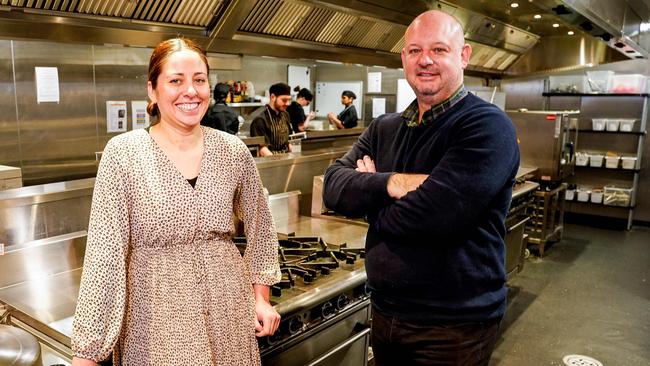Adelaide Institute of Hospitality’s schools program
A cookery and hospitality training provider is warning of a severe skills shortage, and is building closer connections with schools to help bridge the gap.
Business
Don't miss out on the headlines from Business. Followed categories will be added to My News.
A major cookery and hospitality training provider is warning of a severe skills shortage in the industry and is building closer connections with school students to help bridge the gap.
The Adelaide Institute of Hospitality (AIOH) is currently training around 170 apprentices, and delivers VET in schools courses to a similar number of secondary students each year.
But manager Ben Sharp said there was huge demand for skills, with the disruption caused by Covid-19 putting further pressure on the shallow talent pool.
“Our hospitality industry’s in trouble - I reckon we need 60 apprentices right now plus front of house and traineeships. People don’t want to do it for some reason,” he said.
“During Covid, with the shutdowns to hospitality, they’ve had a taste of other careers and also with no international students allowed in it’s a real challenge.”
Earlier this year the AIOH brought in acclaimed chef Emma McCaskill as its new VET in schools business development consultant, to build closer connections between hospitality operators and secondary students.

She said the program informed students about the wide range of career opportunities within the hospitality sector.
“My jobs is to link industry to schools across South Australia, mentor students and help school students get into the industry through school-based apprenticeships,” McCaskill said.
“It’s (hospitality industry) not sold very well in the school space and industry hasn’t really been working with schools up until now.
“Industry wants to work with schools, they want to get involved with what’s happening in the school space, so it’s a really exciting time at the moment for what we’re doing.
“It’s a good start but it’s not a short-term fix (to the skills shortage) - it’s probably a three, four or five year strategy.”
As part of the VET in schools program, students are trained by AIOH chefs in school kitchens or at the AIOH’s Pirie St premises.
McCaskill, who spent close to two decades working in kitchens before taking up the role with the AIOH, will put her apron back on in January to train students at Adelaide Botanic High School.
It is one of around 45 public and private secondary schools currently engaged with the AIOH program, with that number expected to rise to 60 by the end of the year, before a planned overhaul of VET in schools, due to take effect next year.
With a growing number of students, the AIOH has outgrown its current Pirie St premises, and is currently looking for new warehouse-style space to accommodate larger kitchen and training areas.
It also has its eye on the international student market.
The organisation is in the process of setting up an international cooking school at Lot Fourteen’s International Centre for Food, Hospitality and Tourism, and next year Mr Sharp will join the board of Eurhodip - a European industry association that supports hospitality and tourism training providers across the world.
“A lot of our competition in the international space has been Indian and Chinese students,” he said.
“We’re going to go a whole different flavour, Europeans with a really rich food culture, and I think with the way we’ve handled Covid in South Australia it’s going to be very attractive.”
Mr Sharp, a chef who helped establish the AIOH a decade ago, said funding from the state government during Covid-19 helped the organisation to survive and thrive following the pandemic.
“We received funding to build our own online platform - it really forced us to be creative and productive in that time,” he said.
“We had a videographer with us for eight months in the kitchens, helping to create 127 cooking videos - Cert 1, Cert 2, Cert 3, educational videos too - it was full on.
“That has set us up beautifully - it’s given us so much flexibility in the way we deliver training, and for regional clients we can service them a lot better as well.”





